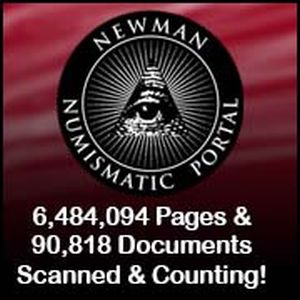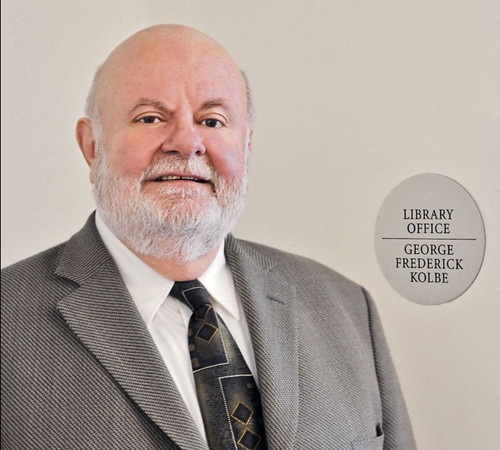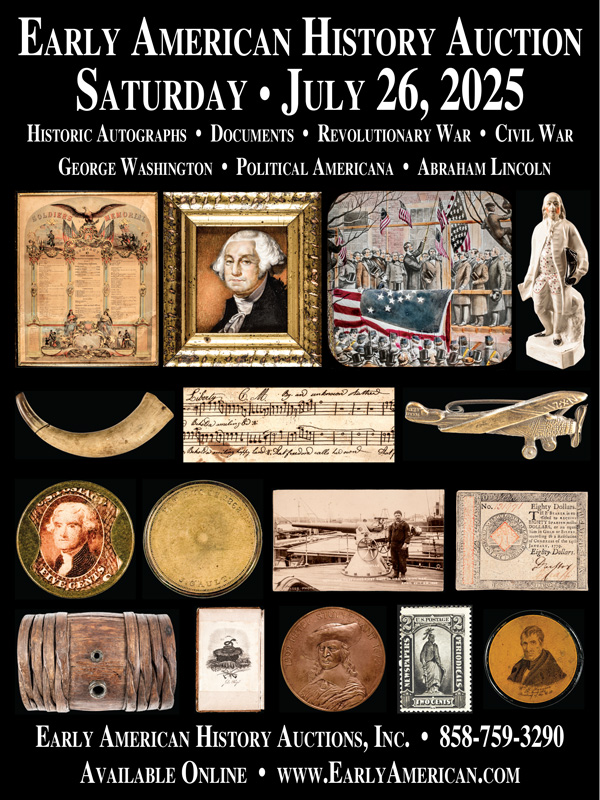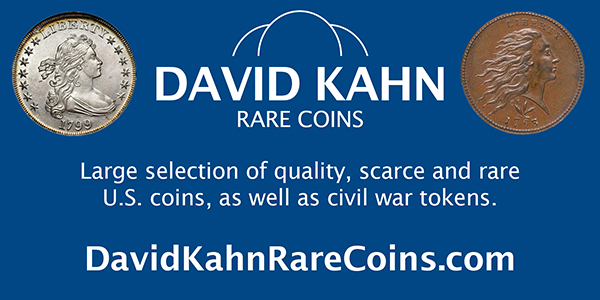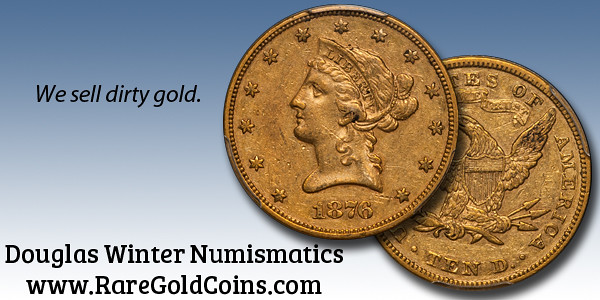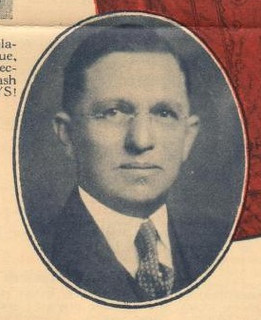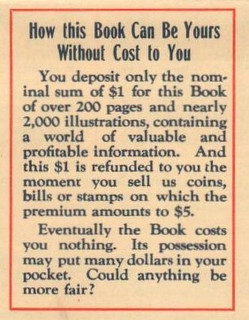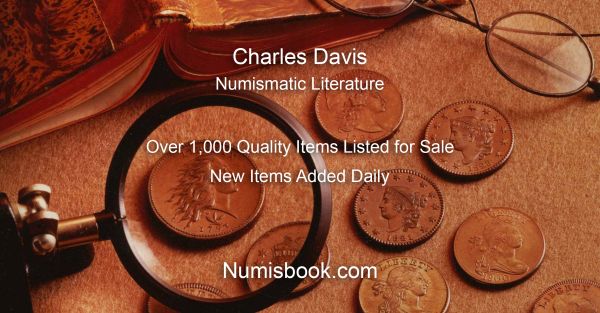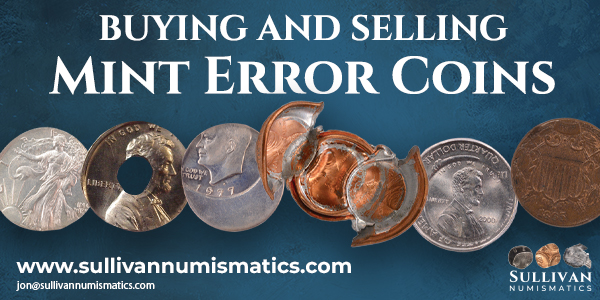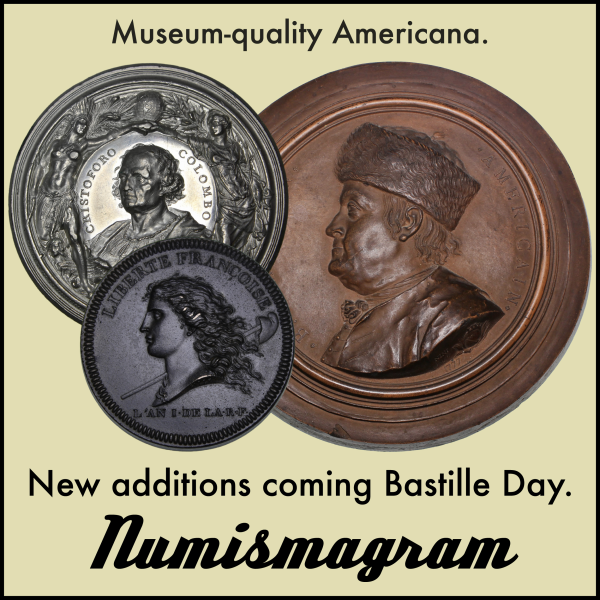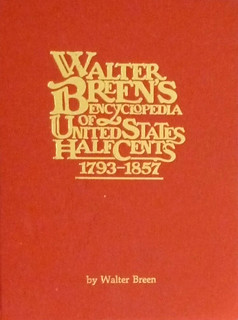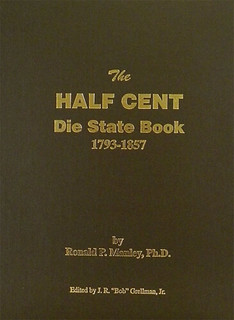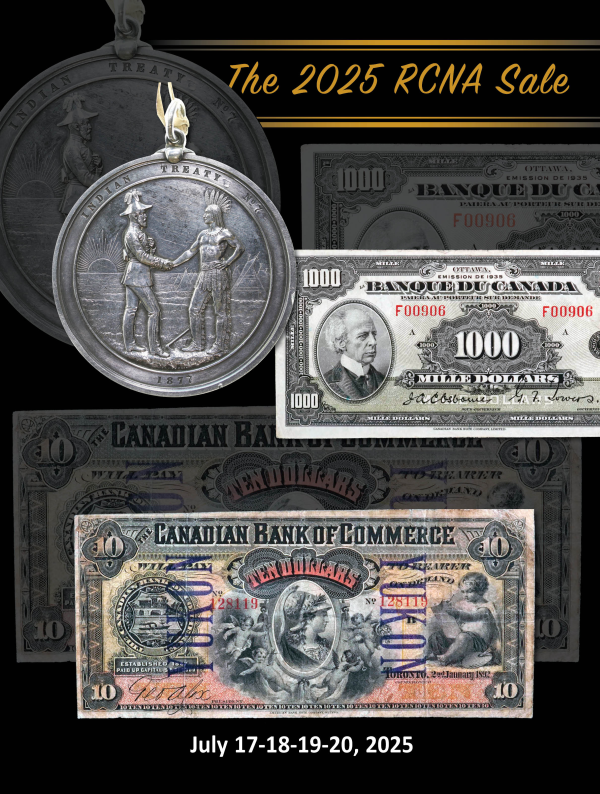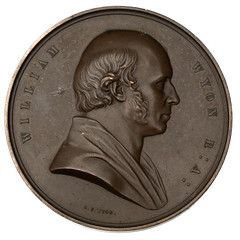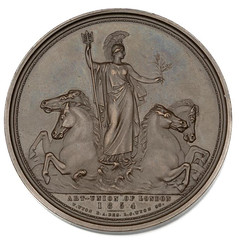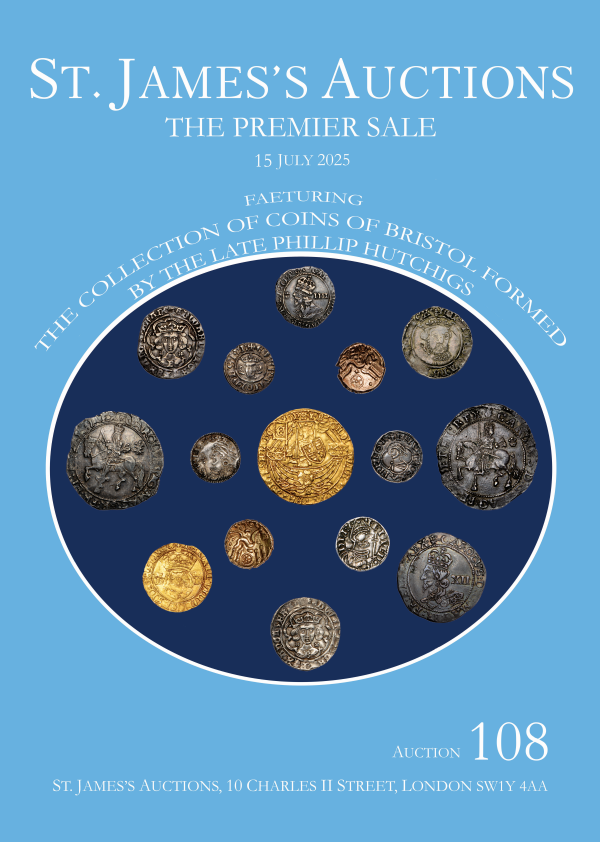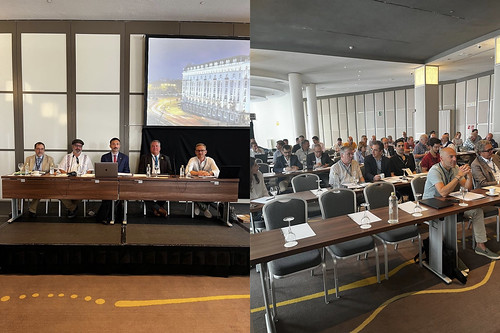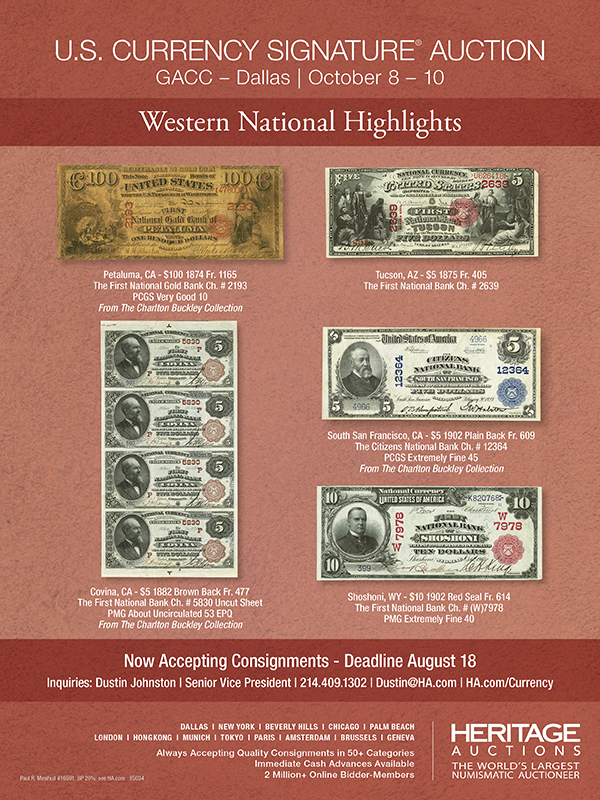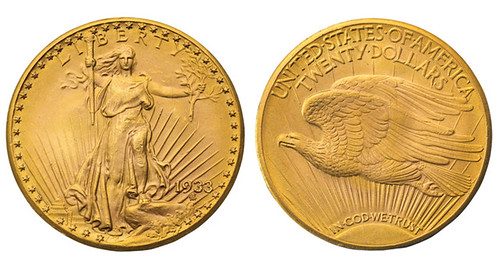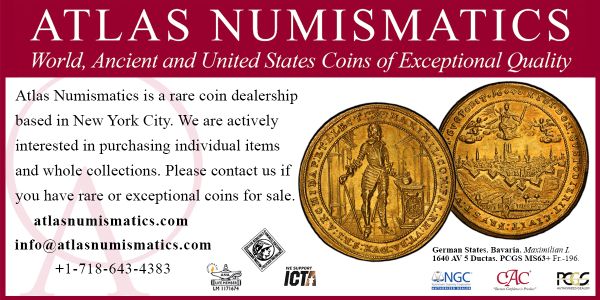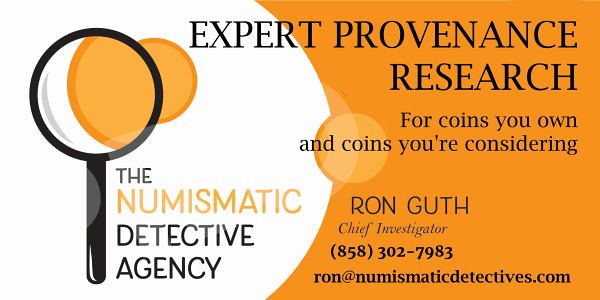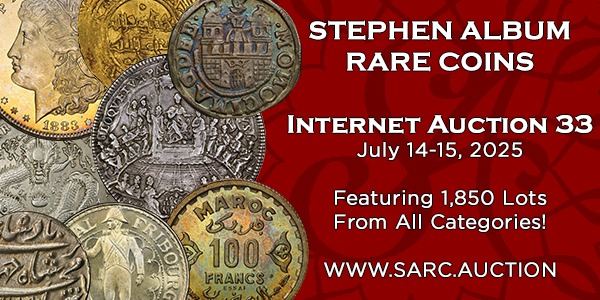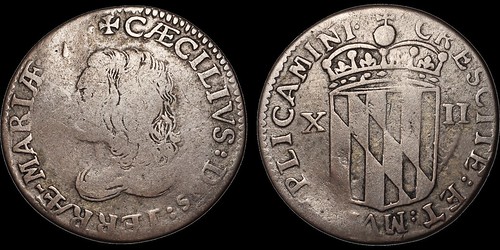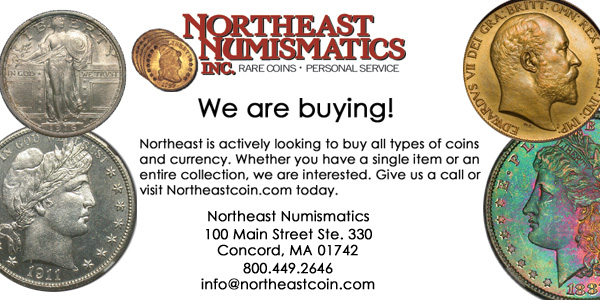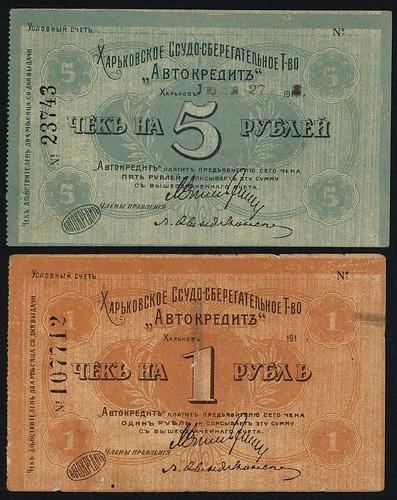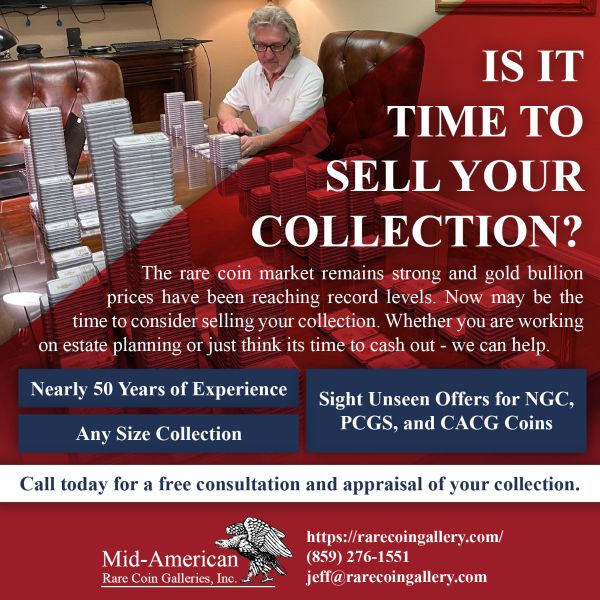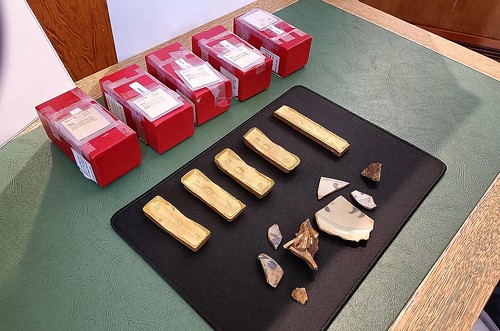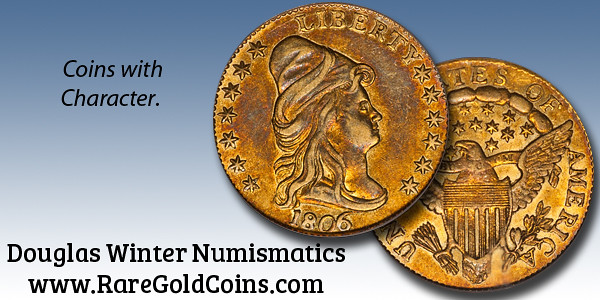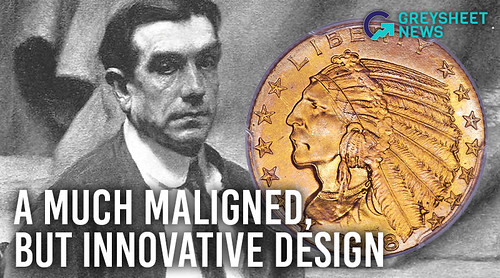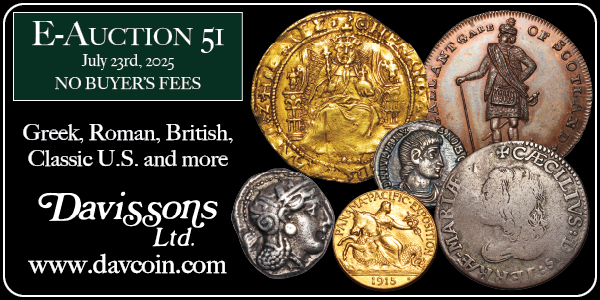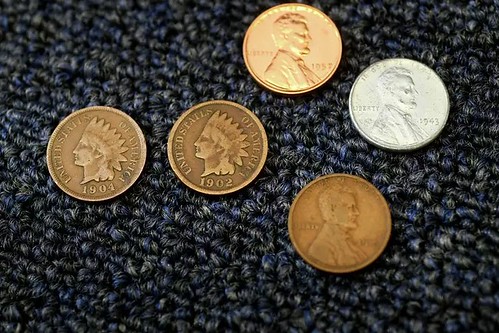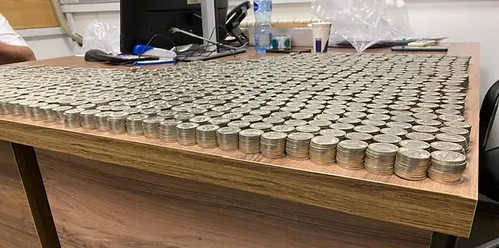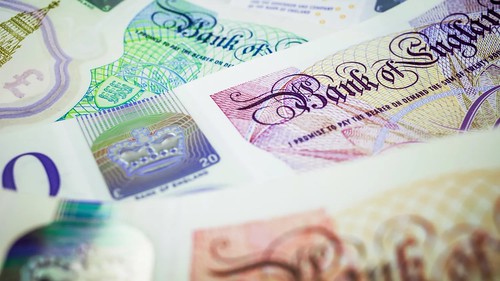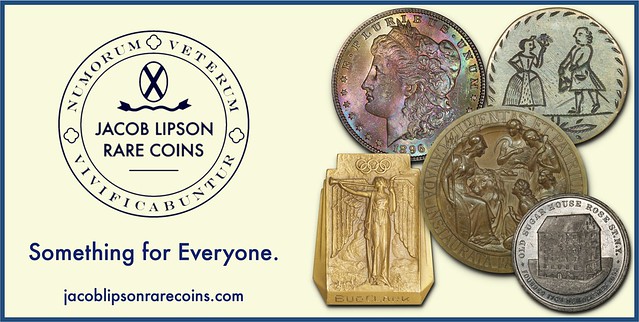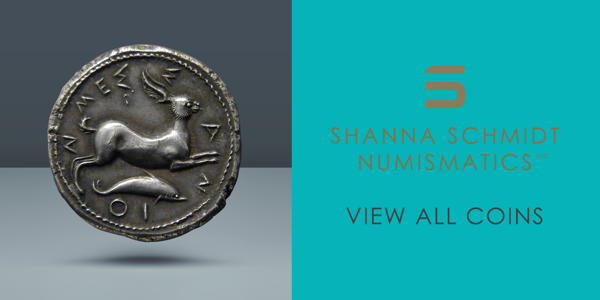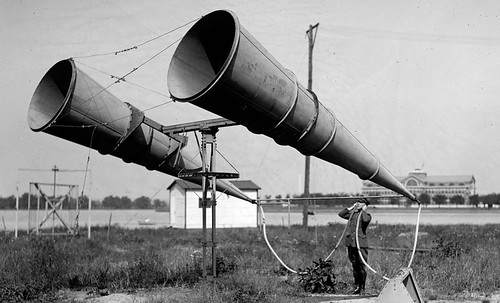
Visit our NBS Sponsors
About UsThe Numismatic Bibliomania Society is a non-profit association devoted to the study and enjoyment of numismatic literature. For more information please see our web site at coinbooks.org SubscriptionsThose wishing to become new E-Sylum subscribers (or wishing to Unsubscribe) can go to the following web page link MembershipThere is a membership application available on the web site Membership Application To join, print the application and return it with your check to the address printed on the application. Print/Digital membership is $40 to addresses in the U.S., and $60 elsewhere. A digital-only membership is available for $25. For those without web access, write to: Jeff Dickerson, Treasurer AsylumFor Asylum mailing address changes and other membership questions, contact Jeff at this email address: treasurer@coinbooks.org SubmissionsTo submit items for publication in The E-Sylum, write to the Editor at this address: whomren@gmail.com BUY THE BOOK BEFORE THE COINSale Calendar
|
- WAYNE'S WORDS: THE E-SYLUM JULY 13, 2025
- GEORGE FREDERICK KOLBE (1941–2025)
- LANG NUMISMATIC LITERATURE AUCTION 7
- BOOK REVIEW: NUMISMATIC LIBRARY OF SARAH BANKS
- DAVID JOHN MACDONALD (1943–2025)
- NNP SCANS STAR RARE COIN ENCYCLOPEDIA
- VIDEO: 1989 CONGRESSIONAL SILVER DOLLAR
- RECOMMENDED HALF CENT BOOKS
- NOTES FROM E-SYLUM READERS: JULY 13, 2025
- 2025 IAPN MADRID CONGRESS REPORT
- VOCABULARY TERM: MEDALLIST, MEDALIST
- THE ONE LOT 1933 DOUBLE EAGLE AUCTION
- ADAM CRUM REMEMBERS RON LANDIS
- THE LORD BALTIMORE SHILLING
- STACK'S BOWERS: RICK SPRINGFIELD SALE
- ARCHIVES INTERNATIONAL SALE 104
- LOOTED CHINESE GOLD BARS SEIZED
- PRATT'S UNUSUAL INCUSE DESIGNS
- THE CENT'S LEGACY
- COUNTERFEIT SWISS FRANCS FOUND IN KOSOVO
- BANK OF ENGLAND TO CHANGE NOTE DESIGNS
- CULTURAL CURRENCY MONEY ART EXHIBIT
- ABOUT THIS ISSUE: JULY 13, 2025
Content presented in The E-Sylum is not necessarily researched or independently fact-checked, and views expressed do not necessarily represent those of the Numismatic Bibliomania Society.
WAYNE'S WORDS: THE E-SYLUM JULY 13, 2025
 Last week readers got a bonus email - an announcement about the Archives International Auction 104. That was a glitch that slipped through accidentally. We don't sell our mailing list. We apologize for the confusion and additional email.
Last week readers got a bonus email - an announcement about the Archives International Auction 104. That was a glitch that slipped through accidentally. We don't sell our mailing list. We apologize for the confusion and additional email.
We're still working on a switch to a new email platform - MailChimp. We hope to complete this over the summer, and the switch should be seamless for readers with nothing to do on your part.
Thank you for reading The E-Sylum. If you enjoy it, please send me the email addresses of friends you think may enjoy it as well and I'll send them a subscription. Contact me at whomren@gmail.com anytime regarding your subscription, or questions, comments or suggestions about our content.
This week we open with the very sad news of the death of our co-founder, a new numismatic literature sale, a book review, updates from the Newman Numismatic Portal, and more.
Other topics this week include collector Sarah Sophia Banks, Mehl's Star Rare Coin Encyclopedia, the Congressional silver dollar, Half Cent books, medallists, the Farouk 1933 Double Eagle, the Lord Baltimore shilling, Ron Landis, Rick Springfield, auction previews, and money art.
To learn more about George F. Kolbe, Greek Overstrikes, the Wyon family of engravers, the IAPN Madrid Congress, the 1787 Brasher Doubloon repro, the American Bond Detector, Chinese gold bars, counterfeit Swiss Franc coins, and Notey McNoteface and the inherently unwell Frankendogs, read on. Have a great week, everyone!
Wayne Homren
Editor, The E-Sylum
GEORGE FREDERICK KOLBE (1941–2025)
Numismatic Bibliomania Society cofounder and U.S. numismatic literature dealer George Kolbe has passed. His partners David & Maria Fanning published this announcement yesterday. -Editor
We are heartbroken to announce the death of the founder of our firm, George Frederick Kolbe. George was known throughout the world as the foremost numismatic bookseller, having established his business in May 1967 and nurtured it over the course of the next fifty-six years into the world's largest independent firm specializing in numismatic literature. He was known to us as our mentor, our partner, and our friend.
LANG NUMISMATIC LITERATURE AUCTION 7
The seventh numismatic literature auction from Numismatic Antiquarian Bookshop Lang closes May 15, 2025. Here's the announcement. -Editor
We are pleased to inform you that the Numismatisches Antiquariat Lang will hold its 7th auction on July 29, 2025 (16:00 CEST) with over 1,100 lots of numismatic literature. This auction is an exceptional opportunity for all lovers and collectors of numismatic literature to acquire rare and valuable works that should not be missing in any library.
BOOK REVIEW: NUMISMATIC LIBRARY OF SARAH BANKS
Jeff Burke submitted this review of the Edward Besly book, The Numismatic Library of Sarah Sophia Banks. Thank you! -Editor
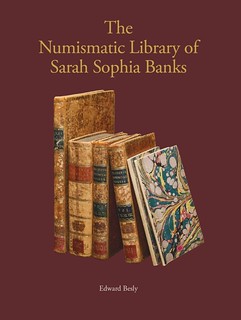 Noted numismatist and collector extraordinaire, Sarah Sophia Banks (1744-1818), lived in
London from 1780 with her brother, Sir Joseph Banks, a renowned botanist, and his wife,
Dorothea. Sarah collected books, coins, tokens, ephemera, and other objects of interest. Her
library, primarily assembled from the mid-1780s to 1818, is a rare surviving library from the late
eighteenth and early nineteenth centuries and its volumes cover three centuries. Following
Banks' passing, most of her books went to the British Museum (now British Library), but
Dorothea, her beneficiary, donated her numismatic library to the Royal Mint. In 1816, her
extensive collection of other numismatic items was also sent to the Mint. (Besly, The Numismatic Library of Sarah Sophia Banks, pp. 8-9.)
Noted numismatist and collector extraordinaire, Sarah Sophia Banks (1744-1818), lived in
London from 1780 with her brother, Sir Joseph Banks, a renowned botanist, and his wife,
Dorothea. Sarah collected books, coins, tokens, ephemera, and other objects of interest. Her
library, primarily assembled from the mid-1780s to 1818, is a rare surviving library from the late
eighteenth and early nineteenth centuries and its volumes cover three centuries. Following
Banks' passing, most of her books went to the British Museum (now British Library), but
Dorothea, her beneficiary, donated her numismatic library to the Royal Mint. In 1816, her
extensive collection of other numismatic items was also sent to the Mint. (Besly, The Numismatic Library of Sarah Sophia Banks, pp. 8-9.)
Banks' numismatic works form the catalogue of Besly's book on this historic figure. Besly's catalogue assemblage was aided by referring to four extant lists of Banks's numismatic library: two produced by Banks, one by her librarian, Jonas Dryander, and a fourth constructed by an unknown writer. Besly opted to focus on the Dryander list to create a new catalogue of Banks's library, because it serves as a window into Dryander's working methods and contemporary ‘best practice[.]'” (Besly, The Numismatic Library, p. 10). In addition, Dryander's list has more bibliographic detail and extensive commentary than Banks's own lists.
DAVID JOHN MACDONALD (1943–2025)
Mark Fox submitted this remembrance of his good friend David MacDonald. Thank you. -Editor
David John MacDonald (1943–2025)
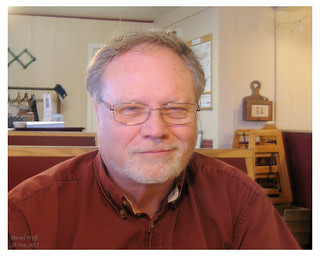 Numismatics lost a close friend and mentor earlier this year with the passing of David John MacDonald of Carlock, Illinois, on March 29, 2025, from an undiagnosed illness that culminated in a fatal case of pneumonia. He was born in Denham, Massachusetts, on June 26, 1943, to Charles MacDonald, a businessman, and his wife Virginia. Still with us are his wife Sharon, younger sister Laurie Dungan (born 1949) of Virginia, and sister-in-law Sheridan Sellers and grandnephew Jonathan Sweet of New York.
Numismatics lost a close friend and mentor earlier this year with the passing of David John MacDonald of Carlock, Illinois, on March 29, 2025, from an undiagnosed illness that culminated in a fatal case of pneumonia. He was born in Denham, Massachusetts, on June 26, 1943, to Charles MacDonald, a businessman, and his wife Virginia. Still with us are his wife Sharon, younger sister Laurie Dungan (born 1949) of Virginia, and sister-in-law Sheridan Sellers and grandnephew Jonathan Sweet of New York.
Many readers in classical numismatic or colonial history circles probably have at least crossed paths with some of Mac's work over the course of his voluminous writing career, stretching from 1969 to books and articles that have yet to be published, whether it be on Roman provincial coinage, Illyrian coins, Greek overstrikes, the Kingdom of the Bosporus, or French Illinois history, to name just a few.
NNP SCANS STAR RARE COIN ENCYCLOPEDIA
The latest addition to the Newman Numismatic Portal is a partial run of B. Max Mehl's Star Rare Coin Encyclopedia. Project Coordinator Len Augsburger provided the following report. -Editor
Newman Portal Scans Star Rare Coin Encyclopedia
Recently scanned by NNP is a partial run of B. Max Mehl's prices paid for list, aka the Star Rare Coin Encyclopedia. Probably the best-selling numismatic book of all time, apart from the Guide Book of United States Coins, Mehl published at least sixty editions, with the sixty-first (1959) being the latest reported by worldcat.org. Mehl thus played a significant role in the formation of coin consciousness” among the American public, even prior to the advent of the ubiquitous coin boards in the 1930s.
VIDEO: 1989 CONGRESSIONAL SILVER DOLLAR
The David Lisot Video Library on the Newman Numismatic Portal can be found at:
https://nnp.wustl.edu/library/multimediadetail/522852
We highlight one of his videos each week in The E-Sylum. Here's one with Michael S. Turrini speaking about the special striking ceremony for the 1989 Congressional Commemorative Silver Dollar. -Editor
RECOMMENDED HALF CENT BOOKS
Bill Eckberg submitted these notes in response to Roger Burdette's request for information on half cent books. Thank you! -Editor
There really are four books and one series that are worth owning.
The first book is Walter Breen's Encyclopedia of United States Half Cents, 1793-1857 by, obviously, Walter Breen. Published in 1983, it has a LOT of information about coinage deliveries and a pretty good emission sequence. Most of the photos are grayscale, but there are color plates of beautiful examples of each year in the back. Also, lots about errors and how they came about. It offers interesting but limited insight on grading. However, some of the information is out of date.
NOTES FROM E-SYLUM READERS: JULY 13, 2025
The Wyon Family of Engravers
Cary Bown writes:
"Regarding the 1854 Art Union of London Medal of William Wyon, I like the reverse design of Brittania. I recently came across this medal in the book "The Wyons" by Leonard Forrer, Reprinted from the Biographical Dictionary of Medallists, Vol. VI. Published by Spink & Son Ltd. London 1917. It can be found online at HathiTrust.org.
"The medal is signed on the obverse under the neck: L.C. Wyon - Leonard Charles Wyon, the eldest son of William. The story of the Wyon family's association with the British Royal Mint as engravers, several occupying the Chief Engraver position, as William did, is amazing. In addition, several others held the office of Chief Engravers of His or Her Majesty's Seals. William's coinage work included those bearing the image of King George IV, William IV and Queen Victoria. The list of coins and medals whose dies the Wyons produced is extensive. Anybody who has ever appreciated a 19th century British coin or medal, might look to one of the Wyons.
"The cover of the July 2025 issue of The Numismatist features an East India Company One Mohur gold piece; William had a role in the production of that coin in that he made a wax model from eminent sculptor John Flaxman's Lion and Palm Tree design that was initially considered for the obverse of an East India Company silver One Rupee coin but ultimately chosen for the reverse of the One and Two gold Mohur coins. Flaxman may have been inspired by the Siculo-Punic coins of the late 4th century bearing a very similar design for the reverse."
I like the reverse as well, and that's what initially caught my eye. Be on the lookout for a long-awaited book by Mark Jones on engraver William Wyon, to be published by SPINK. -Editor
To read the earlier E-Sylum articles, see:
NEW BOOK: WILLIAM WYON
(https://www.coinbooks.org/v25/esylum_v25n27a02.html)
NEW BOOK: WILLIAM WYON
(https://www.coinbooks.org/v28/esylum_v28n18a03.html)
NUMISMATIC NUGGETS: JULY 6, 2025 : 1854 Art Union of London Medal
(https://www.coinbooks.org/v28/esylum_v28n27a20.html)
Other topics this week include Anting-Anting Medals, and the Matlock Coin Thief Episode. -Editor
2025 IAPN MADRID CONGRESS REPORT
The International Association of Professional Numismatists recently concluded a successful Congress in Madrid, Spain. Activities included adding new members, discussing tariff and regulatory issues, awarding the annual book prize, and confirming Rome as the site of the 75th anniversary Congress. -Garrett
The International Association of Professional Numismatists (IAPN) conducted its 73rd annual Congress in Madrid, Spain, from June 22-25, 2025. Forty-four member firms attended the event, held at the recently renovated Palace Hotel, a 1912 Art Nouveau masterpiece.
The Congress approved membership for six numismatic firms:
(1) Antium Aurum (Czech Republic)(https://www.antiumaurum.com/);
(2) Boardwalk Coins (USA)(https://boardwalknumismatics.com/);
(3) Capstone Acquisitions (USA) (https://capstonecoins.com/);
VOCABULARY TERM: MEDALLIST, MEDALIST
Here's another entry from Dick Johnson's Encyclopedia of Coin and Medal Terminology. -Editor
Medallist, Medalist. A designer, engraver, maker or collector of medals; one knowledgeable in medals; also a recipient of a medal. As a creator of medallic art, the medallist must not only be a highly creative artist but also know the many techniques in the field. This talented person must be proficient in producing the patterns required for any medallic item and the working knowledge must include design, relief, the capabilities and limitations of die striking and art casting, and, certainly, patina finishes.
The first medallist was Pisanello, who in 1438 created the first sculpture of what was to be called a pendant medal, a portrait of John Palaeologus. Early medallists had to prepare the entire production of a medal, from pattern to casting the final item, and to patina it. They had to know, and do, every step themselves.
THE ONE LOT 1933 DOUBLE EAGLE AUCTION
E-Sylum Feature Writer and American Numismatic Biographies author Pete Smith submitted his article on the landmark 2002 sale of the Farouk specimen of the 1933 Double Eagle, which was originally published in The Northwest Angle, the newsletter for the Northwest Coin Club. We're republishing it here with permission. Thanks! -Editor
The One Lot Auction
In 2002, I attended the American Numismatic Association Convention at the Marriott Marquis Hotel in Times Square in New York City. I was rooming with Harold Welch at the Milford Plaza, The Lullaby of Broadway.” On our first night, we walked down to the Empire State Building and went up to the observation deck. It was a lovely clear evening. I heard many clusters of viewers talking, and none of them were speaking English.
On another day we took a bus downtown and got off at Trinity Church where Alexander Hamilton is buried. There were many 9-11 memorial markers placed in their fence. Harold and I walked to the site of The World Trade Center. By then the rubble had been removed leaving a large hole in the ground. Some nearby buildings were covered in plastic sheeting while waiting for repair. Later we walked past Federal Hall and the New York Stock Exchange.
ADAM CRUM REMEMBERS RON LANDIS
Here is another remembrance of engraver Ron Landis from Adam Crum's Finest Known. This piece also discusses a fourth example of his coin reproductions, the Brasher Doubloon. -Garrett
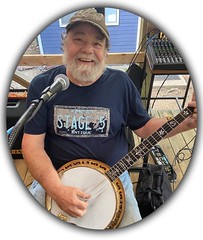 It is with heavy hearts that we mark the passing of Ron Landis, a master engraver, die sinker, and co-founder of the Gallery Mint Museum. A rare combination of artist, historian, and educator, Ron leaves behind a legacy that is as enduring as the coins and medals he so lovingly created.
It is with heavy hearts that we mark the passing of Ron Landis, a master engraver, die sinker, and co-founder of the Gallery Mint Museum. A rare combination of artist, historian, and educator, Ron leaves behind a legacy that is as enduring as the coins and medals he so lovingly created.
Ron was more than an engraver—he was a revivalist of lost techniques and a storyteller in metal. At the Gallery Mint Museum in Eureka Springs, Arkansas, he resurrected 18th- and 19th-century minting traditions, using hand-cut dies and antique screw presses to produce historically faithful recreations of iconic American coinage such as the 1849 $20 Liberty, 1804 Silver Dollar, and 1787 Brasher Doubloon.
THE LORD BALTIMORE SHILLING
In their latest email, Davisson's provided a history of the Lord Baltimore shilling highlighted in last week's E-Sylum. -Garrett
In 1632 Cecil Calvert, the second Baron Baltimore, inherited vast holdings of land in what would later become Maryland. In 1659, believing that his Royal Charter gave him the right to strike coins, he arranged for a small issue of coins to be produced in his name by the Royal Mint in London. His intent was to support the local agrarian economy, which was hampered by the need to use locally produced goods (especially tobacco) as barter in nearly all transactions.
STACK'S BOWERS: RICK SPRINGFIELD SALE
Stack's Bowers will be selling the Rick Springfield Collection of United States Coins as part of their 2025 Summer Global Showcase Auction. Here is the press release. -Garrett
Stack's Bowers Galleries, America's oldest and most accomplished numismatic auctioneer, is honored to announce the upcoming auction of the Rick Springfield Collection. This magnificent cabinet of rare United States gold coins is a testament to the famed singer, songwriter, actor, and entertainer's passion for collecting and outstanding connoisseurship.
In building this highly focused selection of rare coins of about three dozen specimens, Mr. Springfield set out to assemble a world-class United States gold type set. His collection includes historically significant and high-grade specimens that reflect his appreciation for American heritage and numismatic excellence.
I always wanted to own some of the best coins from the best country in the best condition I could collect,” said Mr. Springfield.
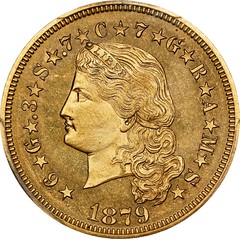
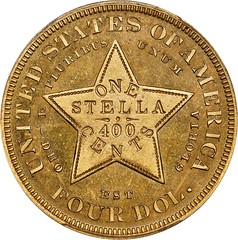
1879 Four-Dollar Gold Stella. Flowing Hair. Judd-1635, Pollock-1833, JD-1. Rarity-3. Gold. Reeded Edge. Proof-65 (PCGS). CAC. CMQ.
Exceptional highlights include:
ARCHIVES INTERNATIONAL SALE 104
Here are some selected lots from the July 23-24, 2025 sale by Archives International Auctions. -Garrett
Kharkov, Ukraine. Lot of 2 notes. 1918. Includes 1 Ruble, orange-brown and black and issued 5 Rubles, green and black. Both P-Unlisted. VF to XF condition. Scarce local notes.
LOOTED CHINESE GOLD BARS SEIZED
The wreck of the French trading ship Le Prince de Conty was discovered in 1974, but was looted the following year. An American novelist and her husband are potentially facing trial in France over illegally selling looted gold bars. Thank you to Leon Saryan for submitting the article. -Garrett
An 80-year-old American novelist and her husband are among several people facing a possible trial in France over the illegal sale of gold bars plundered from an 18th-century shipwreck, after French prosecutors requested the case go to court.
Eleonor "Gay" Courter and her 82-year-old husband Philip have been accused of helping to sell the bullion online for a French diver who stole it decades ago, but have denied knowledge of any wrongdoing.
PRATT'S UNUSUAL INCUSE DESIGNS
A Greyheet article by Michael Garofalo discusses sculptor Bela Lyon Pratt and his innovative incuse designs for the the Quarter Eagle ($2.50) and Half Eagle ($5). Here's an excerpt - see the complete article online. -Editor
Dr. William Sturgis Bigelow was a close friend of President Roosevelt. He was one of the most pre-eminent experts on Japanese art and culture. On returning home to Boston after a long trip to Japan, Senator Henry Cabot Lodge, another friend of Bigelow's and of Pratt's, told Bigelow about the magnificent Saint-Gaudens coinage but also about the problems with the smaller denominations.
Bigelow wrote to Roosevelt, in January of 1908, and stated that he was working with a Boston sculptor on an idea that would permit coins to be struck in high relief but also be easily stackable for commerce. Roosevelt expressed his interest to Bigelow, who asked Pratt to go to work immediately on those two coins.
THE CENT'S LEGACY
This article from CT Insider discusses the legacy of the cent and its history, and includes quotes from John Kraljevich and Seymour, CT dealer Ed Zehall. -Garrett
We pitch it, pinch it, squeeze and squander it. We stuff it in our loafers and offer it for our thoughts. A bad one always turns up and a pretty one is a splurge we heedlessly indulge. It's the penny — the numismatic dust bunny that collects at the bottom of coffee cans, lodges in the pocket of jeans and tumbles out of the dryer like an errant mitten.
Its days are numbered.
THE BOOK BAZARRE
COUNTERFEIT SWISS FRANCS FOUND IN KOSOVO
At a border crossing in Kosovo, officials confiscated a shipment of counterfeit Swiss Franc coins. -Editor
A suspected case of counterfeit money was discovered last night at the entrance to the border crossing in Han i Elezit.
According to the Police, after the initial check and verification of the documentation, the vehicle was selected for a detailed check. During this process, several plastic bags hidden under the front seats of the vehicle were discovered, filled with 2 Swiss Franc (CHF) coins, suspected to be counterfeit.
BANK OF ENGLAND TO CHANGE NOTE DESIGNS
The Bank of England could expand its banknote vignettes beyond just historical figures to include other symbols of national identity such as Stonehenge, oak trees, fish and chips, or football. -Garrett
The Bank of England may drop historical figures from banknotes as it seeks suggestions from the public on replacing Sir Winston Churchill, Jane Austen and JMW Turner.
Banknotes have featured notable historical figures since 1970, when William Shakespeare became the first person other than the monarch to be depicted.
CULTURAL CURRENCY MONEY ART EXHIBIT
The City of Lake Charles, Louisiana is the latest host of the travelling exhibit of money art we discussed last year. -Editor
The innovative exhibit, Cultural Currency: Contemporary Art from the Riemer Collection,” explores the ways value and worth extend beyond the dollar bill. Artists repurpose physical pieces of money, like bills and coins, and transform them into introspective works of art.
It offers a compelling lens through which to examine our relationship with money, something so central to daily life, yet rarely questioned beyond its purchasing power,” said Payton Lundmark, director of cultural affairs for the City of Lake Charles. The exhibition aligns with Historic City Hall's mission to showcase meaningful contemporary art that challenges conventional thinking and sparks dialogue around culture, identity and value.”
ABOUT THIS ISSUE: JULY 13, 2025
Busy week this time - I was working on transitioning our email list to the MailChimp platform while also keeping track of quarterly payments from our advertisers. Thursday evening Len Augsburger and Bruce Perdue were on a video call with me while I walked Bruce through how to publish an issue on the new platform. The transition should be seamless for readers and we hope to complete it this summer.
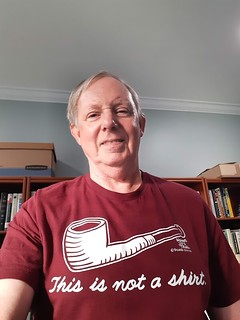 On Friday night I got a text from Garrett wondering if I'd have any articles for him to work on. Crap!! - I'd been so busy I'd forgotten. First thing Saturday I sent him several items that he turned around that day for this issue. Later that morning I learned of the passing of George Kolbe and dropped everything to work on our lead article for the week.
On Friday night I got a text from Garrett wondering if I'd have any articles for him to work on. Crap!! - I'd been so busy I'd forgotten. First thing Saturday I sent him several items that he turned around that day for this issue. Later that morning I learned of the passing of George Kolbe and dropped everything to work on our lead article for the week.
That evening I worked on the money art exhibit story and just had to take this selfie to show my t-shirt for the day, a cartoon nod to Belgian surrealist painter René Magritte, whose work was also echoed in one of the money art works. Our daughter had no clue when she saw my shirt that morning, but she's majoring in nursing, not art history, so I gave her a pass.
If the below photo were numismatic it would be a shoo-in for Image of the Week. I ran across it Saturday morning. My caption would be "Prototype of the world's first hearing aids." Have a great week. -Editor

